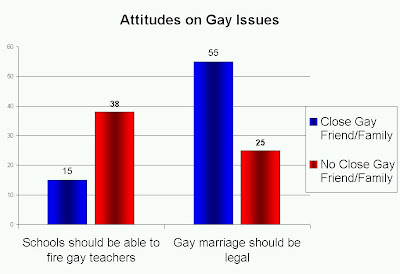Posted by Jay Livingston
In the previous post, I said that professors who have the most negative attitudes towards Evangelicals probably are those who have the least contact with them. I don't have any data on that specific issue, but studies on other topics generally confirm the idea that familiarity breeds content. Or if not content, at least a decrease in antipathy.
The graph shows some data from a survey that asked, among other things, if immigrants were a burden on the US.

The people who had little contact with immigrants were more than twice as likely to say that immigrants were a burden.
I live in New York. Buy food in a grocery store, take a cab, buy a newspaper, eat in a restaurant, check into a hotel or hospital — just about anything you do will bring you into contact with immigrants. I doubt that many New Yorkers see immigrants as a threat to the Republic.
The same principle holds for attitudes on issues that surround homosexuality— should they be allowed to teach in schools, should they be able to marry.
The same is true of homosexuality.

People with no gay friends or relatives are more than twice as likely to favor allowing schools to fire gay teachers. People who do have gay friends or relatives are more than twice as likely to favor allowing gays to marry.
2 comments:
Thats one way of looking at it...if one has contact of the other. I believe there are many factors, to list a few...
1. Upbringing- did ones parents instill negative feelings into their kids)
2. Religious
3. Experiential
4. Generational
5. Geographical/globalization(i think this one could mean familiarity- living , knowing your neighbor)
6. Innate
Great post Jay!
What an interesting post... It nicely demonstrates some important ideas.
I heard of an experiment where they measured racial attitudes among teens before and after outdoor adventure trips, and they were allowed to randomly assign groups to be same race or mixed race. Same findings...
Post a Comment